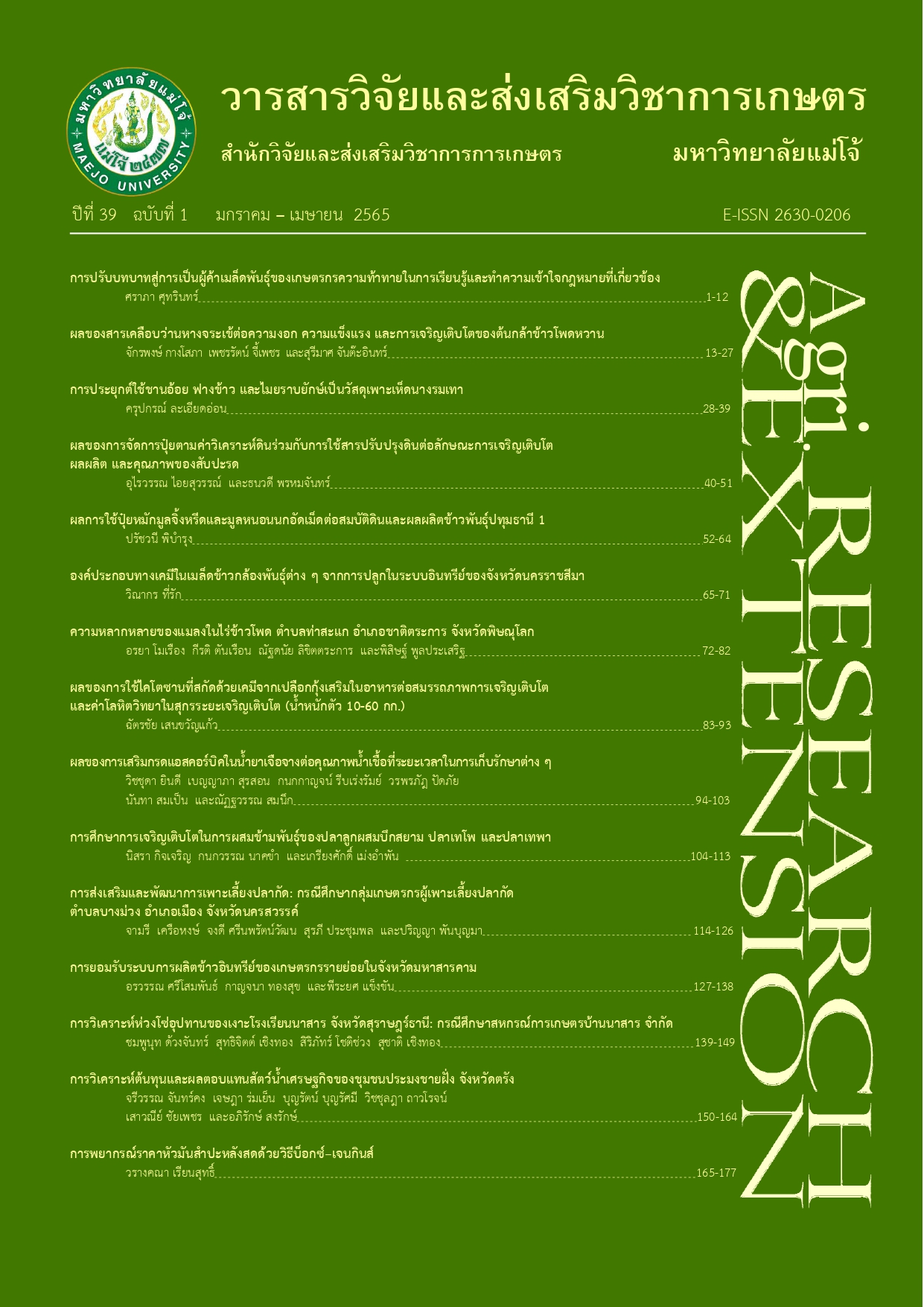การวิเคราะห์ห่วงโซ่อุปทานของเงาะโรงเรียนนาสาร จังหวัดสุราษฎร์ธานี: กรณีศึกษาสหกรณ์การเกษตรบ้านนาสาร จำกัด
คำสำคัญ:
การจัดการห่วงโซ่อุปทาน, เงาะ, สหกรณ์การเกษตรบทคัดย่อ
งานวิจัยนี้ได้ทำการวิเคราะห์ห่วงโซ่อุปทานของเงาะโรงเรียนนาสารของสหกรณ์ฯ ด้วย SCOR Model ตลอดจนเสนอแนวทางการสร้างมูลค่าเพิ่มเงาะคุณภาพ GAP ของสหกรณ์ฯ เป็นงานวิจัยเชิงคุณภาพ โดยการเก็บรวบรวมข้อมูลด้วยวิธีการสัมภาษณ์เชิงลึก ผ่านเครื่องมือแบบสัมภาษณ์กึ่งโครงสร้าง โดยกลุ่มผู้ให้ข้อมูลหลัก คือ ประธานกลุ่ม คณะกรรมการกลุ่มสหกรณ์ฯ และสมาชิกสหกรณ์ฯ จำนวน 8 คน นอกจากนี้คณะผู้วิจัยใช้การสังเกตแบบไม่มีส่วนร่วมจากการจัดประชุมเชิงปฏิบัติการของกลุ่มผู้มีส่วนเกี่ยวข้องกับการยกระดับห่วงโซ่คุณค่าของเงาะคุณภาพ GAP ผลการศึกษาพบว่า ประเด็นปัญหาหลัก คือ การวางแผนและการจัดหาผลผลิตให้ได้ตามความต้องการของตลาด อีกทั้งสหกรณ์ฯ มีความต้องการในการขยายตลาดเงาะคุณภาพ GAP แต่ก็ประสบปัญหาการขาดแคลนผลผลิต เนื่องจากเกษตรกรยังไม่เกิดแรงจูงใจในการผลิตเงาะคุณภาพ GAP เพื่อให้ได้ราคาที่สูงขึ้น ขาดความเข้าใจในเรื่องต้นทุนของการผลิตเงาะคุณภาพ GAP นั้นอาจไม่คุ้มค่ากับราคาที่จะได้รับ มีการรับซื้อปริมาณน้อย ดังนั้นจึงได้เสนอแนะแนวทางการเพิ่มช่องทางการตลาดออนไลน์และตลาดข้อตกลง เพื่อเพิ่มปริมาณการรับซื้อเงาะตามคุณภาพของ GAP
เอกสารอ้างอิง
Buapliansee, N., P. Arruksomboon, B. Kativat and W. Kubkuy. 2018. Supply chain management of vegetable no.8 to elevate the potential of smart farmer group in Phanom Sarakham district, Chachoengsao province. University of the Thai Chamber of Commerce Journal Humanities and Social Sciences 38(44): 52-65. [in Thai]
Choengthong, S., S. Chodchuang, S. Choengthong and C. Duangjan. 2020. The value hain development of rambutan “Rongrien Nasan” through the Ban Na San agriculture cooperative system. 214 p. In Research Report. Bangkok: Thailand Science Research and Innovation (TSRI). [in Thai]
Jussapalo, S. 2017. Approaches of supply chain management of Tha-sa-an’s community enterprise of hydroponic vegetables, Muaeng district, Songkhla province. Journal of Community Development and Life Quality 5(1): 155-162. [in Thai]
Kanklar, S. 2016. Value Chain of Organic Rice Product, Maetang District, Chiangmai. pp. 1-16. In Proceedings of Suan Sunandha Academic National Conference on Research for Sustainable Development 1-2 December 2016. Bangkok: Suan Sunandha Rajabhat University. [in Thai]
Srisookkham, W., N. Phurahong and P. Imsab. 2018. Traceability Quality Vacuum Rice Products of Farmers in Phetchabun. pp. 203-211. In Proceedings of the 3rd National Conference Rajthanee Academic 25 May 2018. Ubonratchathani: Ratchathani University. [in Thai]
Sukchareonpong, S. and D. Thammasiri. 2018. The development of traceability system using QR code technology and retail packaging of pomelos in Nakhon Pathom province. Journal of Management Science Nakhon Pathom Rajabhat University 5(1): 67-78. [in Thai]
Supply Chain Council. 2010. Supply Chain Operations Reference (SCOR) Model: Overview-version 10.0. Cypress: Supply Chain Council, Inc. 179 p.
Surat Thani Provincial Agriculture and Cooperatives Office. 2020. Basic information on agriculture and cooperatives Surat Thani province. [Online]. Available https://www.opsmoac.go.th/suratthani-home (12 January 2020). [in Thai]
Surat Thani Provincial Development Strategy Committee. 2017. Surat Thani province development plan for 20 years (2017-2036). [Online]. Available http://123.242.172.6/yuttasat/document/plan20y.pdf (12 January 2020). [in Thai]
Tongkum, S. 2014. Integrated supply chain of organic vegetables: case study of Chiang Rai Prachanukroh hospital. Area Based Development Research Journal 6(5): 23-37. [in Thai]
ดาวน์โหลด
เผยแพร่แล้ว
รูปแบบการอ้างอิง
ฉบับ
ประเภทบทความ
สัญญาอนุญาต
ลิขสิทธิ์ (c) 2022 วารสารวิจัยและส่งเสริมวิชาการเกษตร

อนุญาตภายใต้เงื่อนไข Creative Commons Attribution-NonCommercial-NoDerivatives 4.0 International License.
บทความนี้ได้รับการเผยแพร่ภายใต้สัญญาอนุญาต Creative Commons Attribution-NonCommercial-NoDerivatives 4.0 International (CC BY-NC-ND 4.0) ซึ่งอนุญาตให้ผู้อื่นสามารถแชร์บทความได้โดยให้เครดิตผู้เขียนและห้ามนำไปใช้เพื่อการค้าหรือดัดแปลง หากต้องการใช้งานซ้ำในลักษณะอื่น ๆ หรือการเผยแพร่ซ้ำ จำเป็นต้องได้รับอนุญาตจากวารสาร





